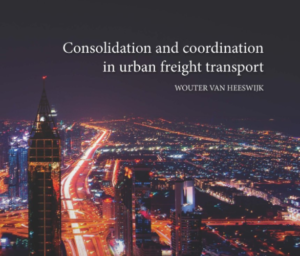Due to growing urbanization, fragmentation of freight flows, and increasingly strict delivery conditions, cities around the world have to deal with a vastly increasing number of freight transport flows. Carriers are unable to efficiently bundle these flows, resulting in inefficient urban transport. This inefficiency contributes to negative environmental effects such as hazardous emissions, traffic jams, and noise hindrance, which reduce the quality of life in urban area.
A natural solution to improve the efficiency of urban distribution is to consolidate freight flows, such that truck capacity may be better utilized and less trucks are needed. However, this solution requires far-reaching cooperation and coordination between independent and often competing stakeholders such as carriers, receivers, and the municipality. In practice, many initiatives fail in providing proper incentives to the involved stakeholders.
The Phd-thesis by TU Twente researcher Wouter van Heeswijk contributes to the problems in urban logistics by exploring coordination and consolidation concepts. The presented research develops and applies mathematical techniques from the field of Operations Research to address planning problems of coordinating actors and to quantify the effects of urban logistics policies.
Researcher Wouter van Heeswijk presents planning tools that support Logistics Service Providers and urban consolidation centers in making dispatching and routing decisions under uncertainty. Simulation experiments show that preserving flexibility in logistics planning and anticipating future order arrivals significantly improve transport efficiency. Furthermore, he presents an agent-based simulation framework that can be used to evaluate the impact of interventions in urban logistics on individual stakeholders. The numerical results show that sustainable solutions are achieved by combining company-driven consolidation initiatives and governmental policies such as vehicle access restrictions and subsidies.
For more information: click here.


Read more about this study on: https://www.sciencedaily.com/releases/2017/05/170529090010.htm